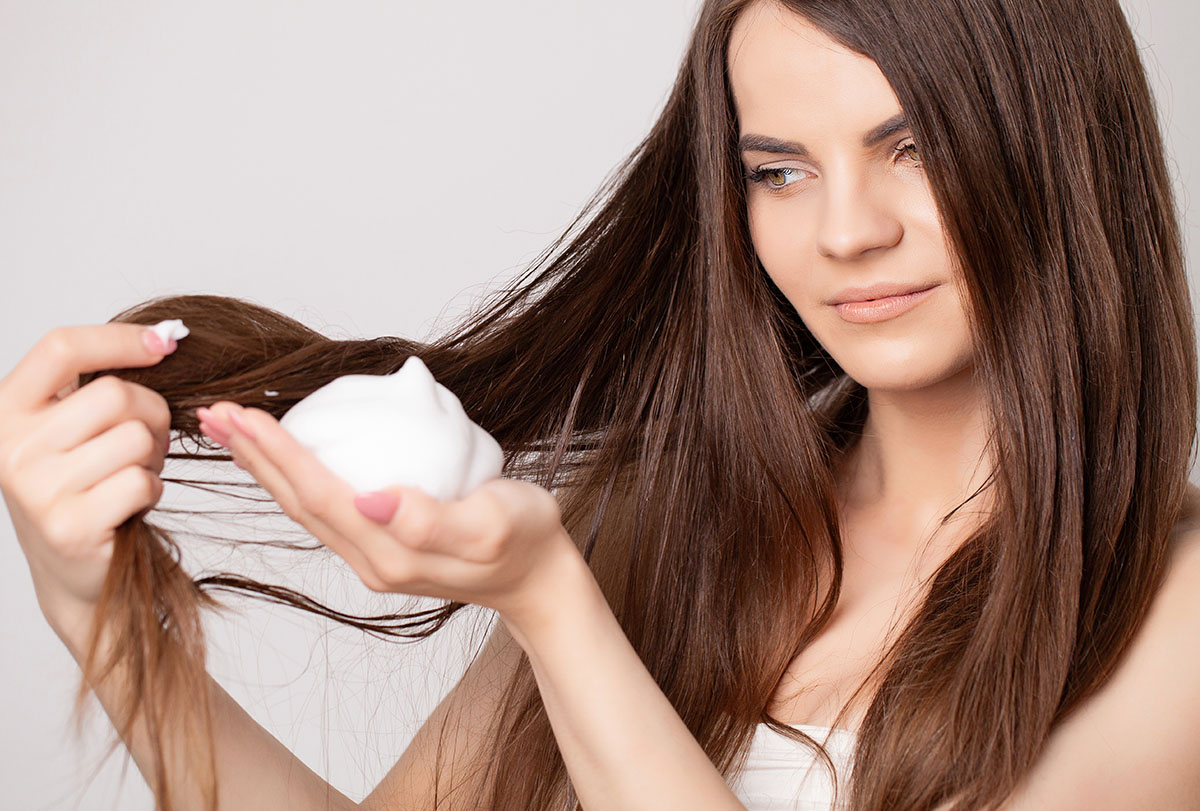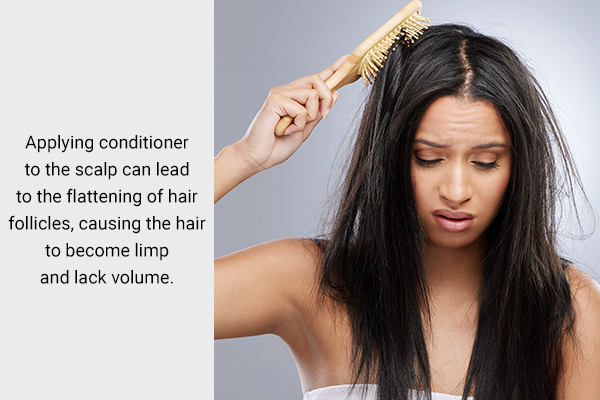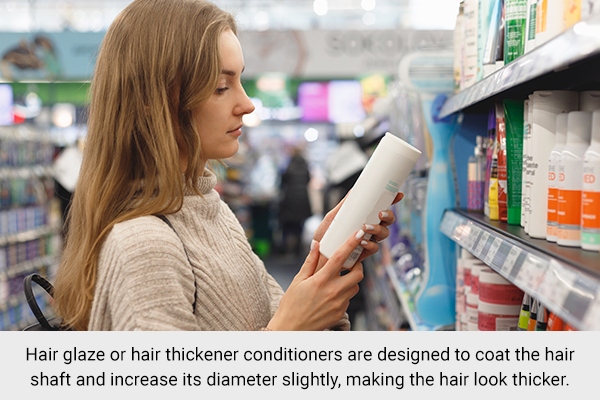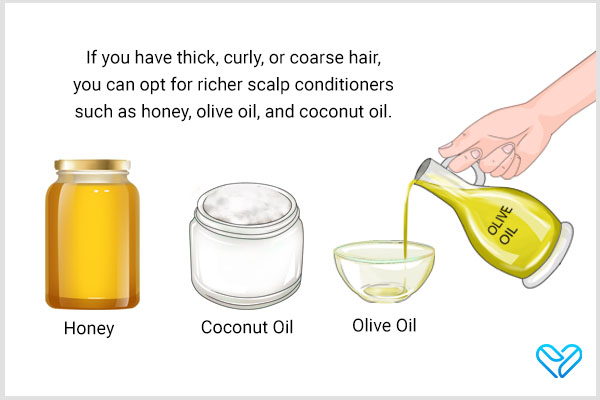In this article:
Conditioners are widely used hair care products that are meant to make the hair smooth, soft, and easy to comb. They are primarily used to moisturize and nourish the hair, making it less prone to breakage and split ends.

While conditioners are often applied to the ends of the hair, some people also apply them directly to the scalp. (1)(2) However, it is generally recommended not to apply conditioner to the scalp, as it is specially formulated for the hair strands from the middle to end, not for the scalp.
This article will explore the reasons conditioners should not be applied to the scalp.
The Risks of Applying Conditioner to the Scalp
While conditioners can provide some benefits to the scalp, there are also some potential risks associated with applying them directly to the scalp.
1. Conditioner buildup on the scalp can cause problems
Conditioners are beneficial for the hair, but applying them to the scalp can lead to some issues.
A research article notes that excessive use of conditioners on the scalp can result in buildup, causing clogged hair follicles, oiliness, and even dandruff. (3) The accumulation of product residues on the scalp can interfere with the natural process of sebum production and cause irritation or inflammation.
Conditioners containing heavy oils or silicones can be especially problematic, as they can trap dirt, oil, and bacteria, leading to scalp problems, such as inflammation and infection. This can cause damage to the hair follicles, which can result in hair loss. (3)(4)
2. Conditioner ingredients can irritate the scalp
Some individuals may be allergic or sensitive to certain ingredients commonly found in conditioners.
Fragrances, preservatives, surfactants, and other such ingredients can cause scalp irritation, itching, and redness. This can be especially problematic for those with preexisting skin conditions such as eczema and psoriasis.
In one study, the researchers found that individuals with sensitive scalps were more likely to experience adverse effects from using hair conditioners. The study included 32 participants who reported symptoms of scalp sensitivity, such as itching, burning, and redness.
The use of hair conditioners was significantly associated with an increased risk of scalp sensitivity symptoms. The adverse effects were more common in individuals who applied conditioner directly to the scalp, rather than only on the hair shaft.
The researchers suggested that the ingredients in hair conditioners, such as preservatives and fragrances, may irritate the scalp and trigger sensitivity symptoms. (3)(4)
3. Conditioner application to the scalp can make hair look greasy

Another potential risk of applying conditioner to the scalp is that it can lead to an overproduction of oil. The scalp naturally produces oil to moisturize and protect the hair, but if too much oil is produced, it can make the hair look greasy and oily.
Moreover, applying conditioner to the scalp can lead to the flattening of hair follicles, causing the hair to become limp and lack volume. This is particularly problematic for individuals with thin or fine hair, as the conditioner can weigh the hair down and make it greasy. (3)
4. Conditioner application to the scalp can cause contact dermatitis
Studies have found that individuals with sensitive scalp were more likely to develop contact dermatitis, a skin condition characterized by inflammation, itching, and redness. The researchers hypothesized that contact dermatitis may be caused by the frequent use of hair conditioners, especially those that contain potential allergens. (4)
In conclusion, while conditioner can be beneficial for hair, applying it to the scalp can lead to a range of disadvantages. So, be mindful of the amount and frequency of conditioner you use on your scalp, as well as the ingredients present in the product.
If scalp irritation or other problems persist, it is best to consult a hair care professional or dermatologist for advice.
Best Practices for Using Conditioner on the Hair and Scalp

Despite the potential risks associated with applying conditioner directly to the scalp, some best practices can help to minimize these risks. One of the most important things to keep in mind is to avoid using too much conditioner.
Another best practice for using conditioner is to choose a conditioner that is specifically designed for your hair type. Using the right conditioner is essential to get the best results for your hair.
Instant conditioners are suitable for daily use with minimally damaged hair. They are the most commonly seen type of conditioner. (1)
Deep conditioners are more concentrated and are left on the hair for 20–30 minutes. They are usually used for extremely dry hair and before chemical treatment such as coloring and waving.
Blow-drying conditioners are suitable for people with fine hair and excessive scalp sebum, as they do not contain oil and can be left on the hair.
Hair glaze or hair thickener conditioners are designed to coat the hair shaft and increase its diameter slightly, making the hair look thicker. These conditioners usually contain proteins as conditioners. It is important to select the appropriate type of conditioner based on your hair type, texture, and condition to get the desired results. (1)
Are Scalp Conditioners Available and for Whom Are They Recommended?
Yes, there are scalp conditioners specifically designed to nourish and care for the scalp. These conditioners are formulated to provide moisture and hydration to the scalp.
Just like your face, your scalp also requires proper moisture balance to function optimally. Using a scalp conditioner can help achieve this balance and promote overall scalp health.
However, it’s important to note that not all hair types can handle the same type of scalp conditioner. Thick or coarse hair may benefit from a richer and more intense moisturizing conditioner, while finer hair types may find such products too heavy and weighing down their hair.
Alternatives to Applying Conditioner to the Scalp

If you’re worried about the possible drawbacks of using conditioner on your scalp, try some alternative ways to care for your hair.
Instead of traditional conditioners, you can try using scalp treatments such as hair masks or serums. These products provide nourishment and moisture to your scalp without causing clogged hair follicles or excessive oiliness.
You can also explore natural oils that serve as DIY scalp conditioners. For those with fine hair, lighter oils such as argan oil, jojoba oil, and sweet almond oil are suitable choices. If you have thick, curly, or coarse hair, you can opt for richer scalp conditioners such as honey, olive oil, and coconut oil. (5)
Should Hair Conditioner Be Used Daily?
To maintain nourished and manageable hair, it is essential to use conditioner regularly. However, daily use may not be suitable or beneficial for everyone.
For those with thin or fine hair, experts recommend avoiding the daily use of conditioner, as it can weigh down the hair and lead to greasiness. However, using conditioner every day can be beneficial for those with thick, curly, or coarse hair, as it helps to prevent frizz and maintain moisture levels.
As a general rule, professionals recommend using conditioner 2–3 times a week. For individuals with dry or damaged hair, using a leave-in conditioner or hair mask once a week can provide extra hydration and nourishment. (6)(1)
Most-Asked Questions About Hair Conditioners
How often should I use conditioner on my hair?
It depends on your hair type, texture, and condition. Generally, experts recommend using conditioner 2–3 times a week, but this can vary.
What are the benefits of using deep conditioners?
Deep conditioners are more concentrated than instant conditioners and are left on the hair for a longer period, providing intense moisture and nourishment to dry or damaged hair. (1)
Can using conditioner make my hair greasy?
Using conditioner every day can weigh down thin or fine hair and make it look greasy. It’s important to choose a conditioner that is appropriate for your hair type and needs and to apply it correctly to avoid any product buildup or irritation.
What are some tips for using conditioners effectively?
Choose a conditioner that is appropriate for your hair type and needs, and apply it only to the length of your hair, avoiding the scalp. Leave the conditioner in for the recommended amount of time, and then rinse it off thoroughly with cool water.
Final Word
It is best not to apply conditioner to the scalp. While conditioners can provide several benefits to the hair, including increased moisture and better hair management, there are also some potential risks associated with applying it directly to the scalp, such as clogged hair follicles and an overproduction of oil.
- Was this article helpful?
- YES, THANKS!NOT REALLY


